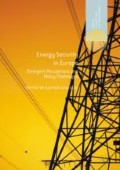Abstract
Claes first refines the concept of energy security into physical, economic and political components, which contain both structural and strategic elements. He then provides a historical account of how the European Great Powers, and later the European Union, have followed various strategies in order to secure oil supplies from external sources. The challenges facing the EU in this endeavour are discussed further in relation to the “Peak Oil” debate and the import dependency of EU member states. This is followed by a critical assessment of the EU’s ability to act coherently and effectively in the political diplomacy of the global oil market.
Access this chapter
Tax calculation will be finalised at checkout
Purchases are for personal use only
Notes
- 1.
http://ec.europa.eu/energy/security/index_en.htm. Accessed on August 29, 2010.
- 2.
The designation “the Seven Sisters” was first used by the Italian oilman Enrico Mattei and was later used as the title of Anthony Sampson’s book about the seven largest oil companies (Sampson 1975: 11). This group comprises Exxon, Mobil, Standard Oil of California, Texaco, Gulf (all American), British Petroleum (BP; 51 per cent of the shares were formerly held by the British government) and Royal Dutch/Shell (60 per cent Dutch and 40 per cent British). Compagnie Francaise des Pètroles (CFP) is sometimes included in this group, despite representing a minimal share of world production (approximately 1.2 per cent in 1950) (Schneider 1983: 39).
- 3.
WSJ News Graphics, April 15, 2016, http://graphics.wsj.com/oil-barrel-breakdown/. Based on Rystad Energy Ucube.
- 4.
BP Statistical Review of World Energy, 1980 and 2016.
- 5.
Quoted in Yergin 2006: 69.
References
Adelman, Morris A. 1993a. The Economics of Petroleum Supply. Cambridge, MA: MIT Press.
———. 1993b. Modelling World Oil Supply. The Energy Journal 4 (1): 1–33.
———. 1995. The Genie Out of the Bottle—World Oil since 1970. Cambridge, MA: MIT Press.
Areklett, Kjell, et al. 2010. The Peak of the Oil Age—Analyzing the World Oil Production Reference Scenario in World Energy Outlook, 2008. Energy Policy 38: 1398–1414.
Baldwin, David A. 1979. Power Analysis and World Power. World Politics 31 (2): 161–194.
Blair, John M. 1976. The Control of Oil. New York: Vintage Books.
BP. 2016. BP Statistical Review of World Energy. London: British Petroleum.
Buzan, Barry, and Ola Wæver. 2003. Regions and Powers. Cambridge: Cambridge University Press.
Campbell, Colin J. 2005. Oil Crisis. Brentwood: Multi-Science Publishing.
CIEP. 2004. Study on Energy Supply Security and Geopolitics. Report Prepared for DGTREN. The Hague: Institute for International Relations. Clingendael International Energy Programme. Accessed from: http://ec.europa.eu/comm/energy_transport/doc/2004_lv_ciep_report_en.pdf.
Claes, Dag Harald. 2001. The Politics of Oil-Producer Cooperation. Boulder: Westview Press.
Colgan, Jeff D., Robert O. Keohane, and Thijs Van de Graaf. 2012. Punctuated Equilibrium in the Energy Regime Complex. The Review of International Organizations 7 (2): 117–143.
Darmstadter, Joel, Perry D. Teitelbaum, and Jaroslav G. Polach. 1971. Energy in the World Economy—Statistical Review of Trends in Output, Trade, and Consumption Since 1925. Baltimore: Johns Hopkins Press.
Deffeyes, Kenneth S. 2005. Beyond Oil: The View from Hubbert’s Peak. New York: Macmillan—Hill and Wang.
EC. 2014. European Energy Security Strategy, European Commission COM (2014) 330 final, 10.
———. 2006. A European Strategy for Sustainable, Competitive and Secure Energy. EU Commission Green Paper.
EU Council. 2015. Outcome of Proceedings—Council Conclusions on Energy Diplomacy. Council of the European Union, Ref. 10995/15.
Eurostat. 2016. Main Origin of Primary Energy Imports, EU-28, 2004–14 (% of Extra EU-28 Imports) YB16.png.
Evans, John. 1990. OPEC and the World Energy Market: A Comprehensive Reference Guide. Essex: Longman.
FTC. 1952. The International Petroleum Cartel. Washington, DC: Staff Report to the Federal Trade Commission.
Goldthau, Andreas, and Jan M. Witte, eds. 2010. Global Energy Governance—The New Rules of the Game. Berlin: Global Public Policy Institute.
Kissinger, Henry. 1982. Foreword. In The Critical Link: Energy and National Security in the 1980s, ed. Charles K. Ebinger. Cambridge: Ballinger.
Kohl, Wilfrid L. 2010. Consumer Countries’ Energy Cooperation: The International Energy Agency and the Global Energy Order. In Global Energy Governance—The New Rules of the Game, ed. Andreas Goldthau and Jan Martin Witte. Washington, DC: Brookings Institution.
Lesage, Dries, Thijs Van de Graaf, and Kirsten Westphal. 2010. Global Energy Governance in a Multipolar World. Farnham: Ashgate Publishing.
Luciani, Giacomo. 2005. EUROGULF—An EU-GCC Dialogue for Energy Stability and Sustainability. Executive Summary and Policy Paper. Florence: European University Institute. Accessed from: http://www.iue.it/RSCAS/e-texts/200503EUROGULF_Summ&PP.pdf.
Mabro, Robert. 1987. Netback Pricing and the Oil Price Collapse of 1986, Working paper WPM 10. Oxford Institute for Energy Studies.
Odell, Peter R.1994. World Oil Resources, Reserves and Production. Energy Journal 15 (Special Issue on The Changing World Petroleum Market): 89–114.
Pindyck, Robert. 1978. OPEC’s Threat to the West. Foreign Policy 30 (Spring): 36–52.
Robinson, Jeffrey. 1988. Yamani—The Inside Story. London: Simon & Schuster.
Sampson, Anthony. 1975. The Seven Sisters: The Great Oil Companies and the World They Made. London: Hodder and Stoughton.
Scharpf, Fritz. 1999. Governing in Europe—Effective and Democratic? Oxford: Oxford University Press.
Schneider, Steven A. 1983. The Oil Price Revolution. Baltimore: Johns Hopkins University Press.
Stritzel, Holger. 2007. Towards a Theory of Securitization: Copenhagen and Beyond. European Journal of International Relations 13 (3): 357–383.
Yergin, Daniel. 1988. Energy Security in the 1990s. Foreign Affairs 67 (1): 110–132.
———. 1991. The Prize—The Epic Quest for Oil, Money and Power. London: Simon & Schuster.
———. 2006. Ensuring Energy Security. Foreign Affairs 75 (2): 69–82.
Author information
Authors and Affiliations
Editor information
Editors and Affiliations
Rights and permissions
Copyright information
© 2018 The Author(s)
About this chapter
Cite this chapter
Claes, D.H. (2018). The Global Oil Market and EU Energy Security. In: Szulecki, K. (eds) Energy Security in Europe. Energy, Climate and the Environment. Palgrave Macmillan, Cham. https://doi.org/10.1007/978-3-319-64964-1_12
Download citation
DOI: https://doi.org/10.1007/978-3-319-64964-1_12
Published:
Publisher Name: Palgrave Macmillan, Cham
Print ISBN: 978-3-319-64963-4
Online ISBN: 978-3-319-64964-1
eBook Packages: Social SciencesSocial Sciences (R0)

